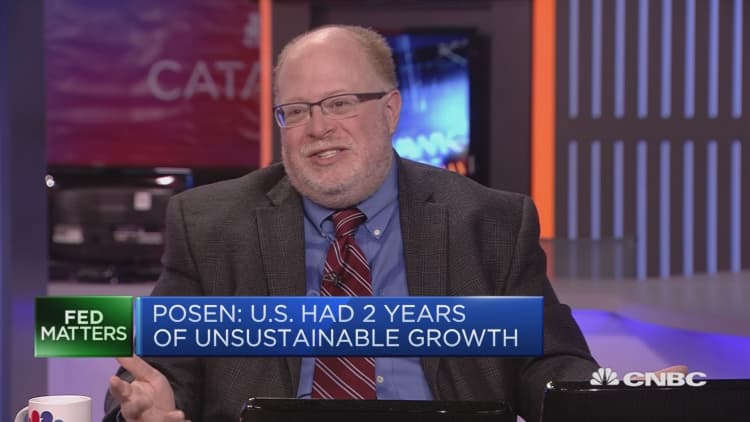
The inability of the U.S administration to pass new tax cuts has delayed the next boom and bust cycle in the country, according to one economist, who is still predicting that the U.S. is ultimately headed for a recession.
Adam Posen, president of the Peterson Institute for International Economics, told CNBC in March that he believed the U.S. was facing a downturn in the next two years as a result of excessive fiscal stimulus from the Trump administration. On Tuesday, he revealed his view had now changed.
"First, like a lot of people, but I'll take it on myself, I got wrong the timing of the tax cuts. I couldn't believe they would spend this long before getting to a budget with Congress, that they would waste all this time on non-proposals with health care," he told CNBC on Tuesday.
Posen, who served at the Federal Reserve Bank of New York in the mid-1990s, said stimulus is still on the way in the form of significant business tax cuts that will be unfunded, but will be a year later than he thought.
"That pushes back the date at which the Fed will have to raise (interest rates) a lot," he said.
Posen's prediction is that tax cuts and deregulation will lead to a boom-bust cycle as the Federal Reserve will tighten policy to stave off a credit boom.
Despite the administration's failure to pass much major legislation, as well as divisions in the Republican Party, Posen does believe tax cuts will be delivered as politicians will want a win ahead of the mid-term elections.
"They can't go into the mid-term elections, face constituents and have done nothing. The failures in health care and everything else means they have to deliver and tax cuts are the most obvious thing," he said.
"Secondly, I've always been very cynical of Congress' so-called budget hawks on the budget. The history of the U.S. basically since 1974, every time Congress passes a rule on itself to restrict the budget, it violates that rule within two to four years."
He says the idea that Tea Party Republicans and budget hawks won't allow tax cuts because they may bust the budget is "ridiculous" and predicts they will all agree on tax cuts in the end.


